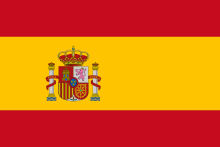Spanish peoples
 |
|
| Total population | |
|---|---|
|
Spain Nationals 41,539,400 Hundreds of millions with Spanish ancestry in former colonies Nationals Abroad : 2,183,043 Total abroad: 2,183,043, which of them:733,387 are born in Spain 1,303,043 are born in the country of residence 137,391 others |
|
| Regions with significant populations | |
|
|
404,111 (92,610 born in Spain) |
|
|
215,183 (124,153 born in Spain) |
|
|
188,585 (56,167 born in Spain) |
|
|
146,846 (61,881 born in Spain) |
|
|
117,523 (29,848 born in Spain) |
|
|
108,858 (2,114 born in Spain) |
|
|
108,314 (17,485 born in Spain) |
|
(including Puerto Rico) |
103,474 (48,546 born in Spain) |
|
|
103,247 (48,546 born in Spain) |
|
|
81,519 (54,418 born in Spain) |
|
|
63,827 (12,023 born in Spain) |
|
|
56,104 (9,669 born in Spain) |
|
|
53,212 (26,616 born in Spain) |
|
|
30,683 (8,057 born in Spain) |
|
|
24,485 (17,771 born in Spain) |
|
|
21,974 (12,406 born in Spain) |
|
|
20,898 (11,734 born in Spain) |
|
|
19,668 (4,028 born in Spain) |
|
|
18,928 (3,622 born in Spain) |
|
|
18,353 (10,506 born in Spain) |
|
|
16,482 |
|
|
15,390 |
|
|
15,214 |
|
|
12,375 |
|
|
9,311 |
|
|
8,003 |
|
|
6,794 |
|
|
3,110 |
|
|
2,500 |
|
|
2,450 |
|
|
2,118 - 45,935 |
|
|
1,826 |
|
|
1,489 |
|
|
1,283 |
|
|
1,007 |
| Languages | |
|
Languages of Spain (Spanish, Basque, Catalan, Galician and others) |
|
| Religion | |
|
|
| Related ethnic groups | |
|
|
Spain Nationals 41,539,400
(for a total population of 47,059,533)
Hundreds of millions with Spanish ancestry in former colonies
Nationals Abroad : 2,183,043
Spaniards are a nation and ethnic group indigenous to Spain that share a common Spanish culture and speak one of the national languages of Spain, including most numerously Spanish, as a primary language. Within Spain, there are a number of nationalisms and regionalisms, reflecting the country's complex history and diverse culture. Although the official language of Spain is commonly known as "Spanish", it is only one of the national languages of Spain, and is less ambiguously known as Castilian, a standard language based on the medieval romance speech of the early Kingdom of Castile in north-central Spain and the Mozarabic dialect of the Taifa of Toledo which was incorporated by the former in the 11th century. There are several commonly spoken regional languages, most notably Basque (a Paleohispanic language), Catalan and Galician (both Romance languages like Castilian). There are many populations outside Spain with ancestors who emigrated from Spain and who share a Hispanic culture; most notably in Hispanic America.
The Roman Republic conquered Iberia during the 2nd and 1st centuries BC. As a result of Roman colonization, the majority of local languages, with the exception of Basque, stem from the Vulgar Latin. The Germanic Vandals and Suebi, with part of the Iranian Alans under King Respendial conquered the peninsula in 409 AD. The Iberian Peninsula was conquered and brought under the rule of the Arab Umayyads in 711 and by the Berber North African dynasties the Almohads and the Almoravids in the 11th and 12th centuries. Following the eight century Christian Reconquista against the Moors, the modern Spanish state was formed with the union of the Kingdoms of Castille and Aragon, the conquest of the last Muslim Nasrid Kingdom of Granada and the Canary Islands in the late 15th century. In the early 16th century the Kingdom of Navarre was also conquered. As Spain expanded its empire in the America's, religious minorities in Spain were either converted or expelled and the Catholic church fiercely persecuted heresy during a period known as the Spanish Inquisition. In parallel, a wave of emigration began to the Americas began with over 16 million people emigrating to the Americas during the colonial period (1492-1832). In the post-colonial period (1850–1950), a further 3.5 million Spanish left for the Americas, particularly Argentina, Uruguay, Mexico,Brazil, Chile, Venezuela, Puerto Rico and Cuba. As a result, Spanish-descendants in Latin America number in the hundreds of millions.
...
Wikipedia
